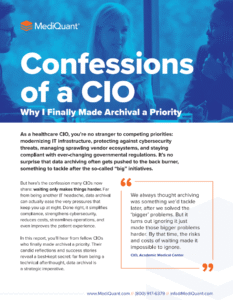EHR Data Transfer – 6 Steps to Successfully Move Data to a New EHR
1. Analyze Old EHR Data
2. Plan the Data Transfer
3. Minimize Downtime
4. Move the Data
Choose the most suitable format for your data transfer. If the old system can export data in HL7 or Continuity of Care Record format, you may use those to move the data.
Otherwise, you need to transfer the data from the old database in field and record format.
Before transferring data from the old EHR to the new one, ensure that you do field mapping. This process enables you to confirm that the correct data comes into the new system’s data fields.
Then using the appropriate tools, extract, transform, and load the data from the legacy database into a staging database. Some of the data may not fit perfectly into the new database, and such data must still be transferred, although it may be held in an unstructured format.
5. Test the Data
6. Go Live
Want to have an expert migrate or extract data for you?
Contact MediQuant at 844.286.8683 to see a free demo of our data extraction tool and process. You can also reach us through our contact page to discuss all your data archiving and migration needs.
More Thought Leadership
EMR Data Conversion: A 5-Step Guide to Getting It Right
EMR data conversion is the process of securely transferring patient data from a legacy electronic medical record (EMR) system into a new one. It’s a foundational step for health systems navigating mergers, EHR upgrades, or the sunsetting of unsupported platforms. And...
Your EHR Isn’t the Whole Story. Healthcare Data Archiving Fills the Gaps.
You want better care, stronger outcomes, and patient experiences that build trust? Then your providers need more than just today’s patient charts. They need access to the full patient history, including the data within HIT applications that are no longer in use. ...
Technical Debt Is Quietly Killing Your IT Strategy
Why CIOs Say Application Rationalization Is the Best Line of DefenseIf your IT application portfolio were a closet, half would still have tags. A quarter wouldn’t fit. And the rest? No one remembers buying. In hospital IT environments, the more outdated apps you’re...
Contact Us Today







